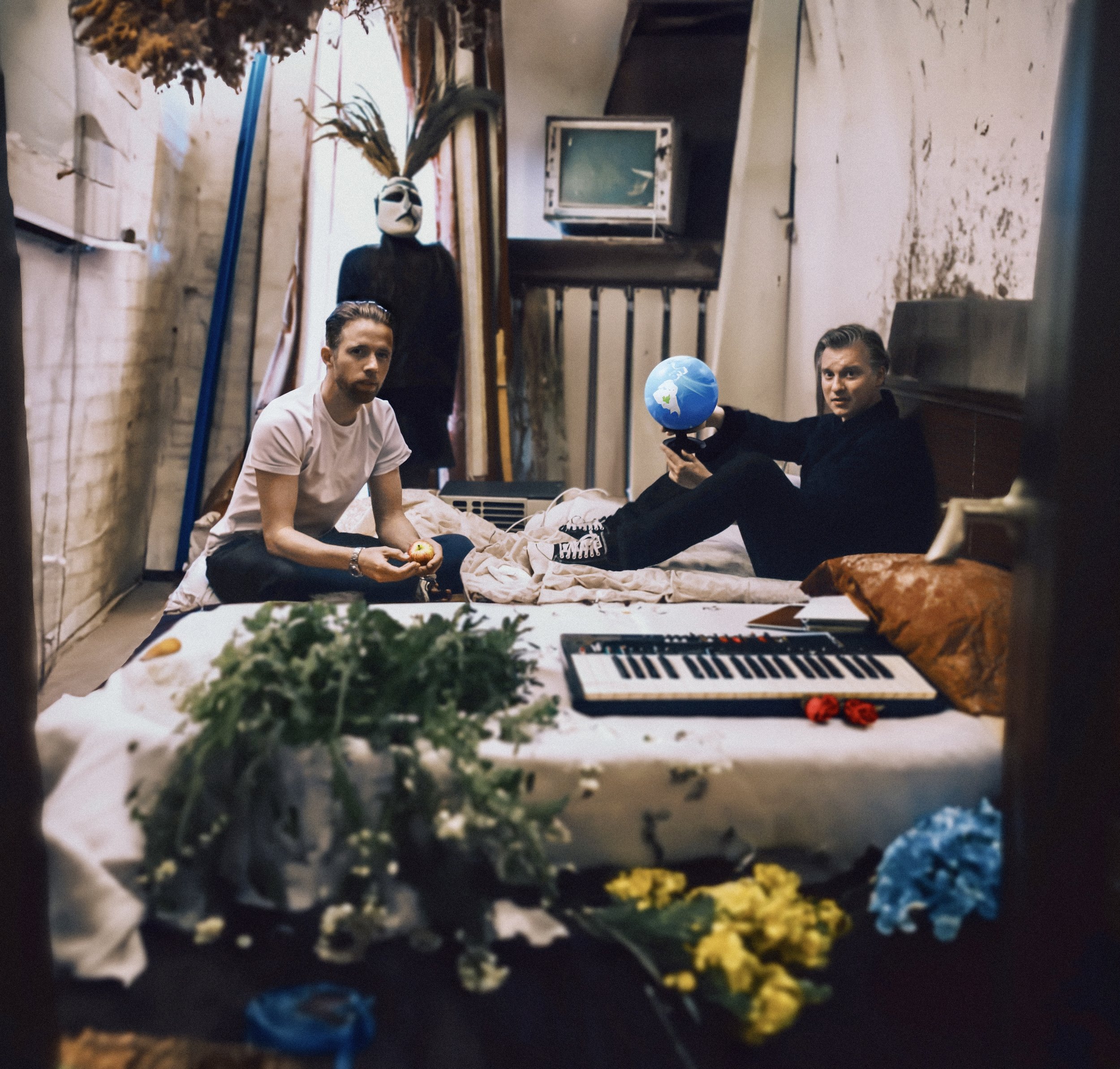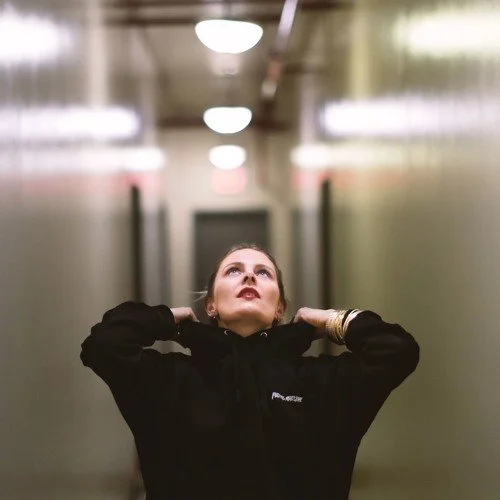Echoes & Noise: The Story of Blue Foundation (Podcast)
A conversation
Exclusive and candid conversation with Tobias Wilner of Blue Foundation in 2023 discussing an upcoming album, the founding philosophy of Blue Foundation, the backstory of their acclaimed "Sweep Of Days" album, upcoming concerts in 2024 featuring the album, the decision to part ways with Kirstine Stubbe Teglbjærg in 2009, and insights into their collaborations with Sara Savery, Sonya Kitchell, Helena Gao and Cæcilie Trier.
A segment taken from the November 21, 2023 Gaffa interview, conducted by Ole Rosenstand Svidt. The initial interview was in Danish and has been translated. Link for the original interview at the bottom of the page.
Blue Foundation captured in 2023.
We spoke with one of the masterminds behind the group, Tobias Wilner, about how he views Sweep of Days today, what to expect from the upcoming anniversary concerts, and what else Blue Foundation is up to, especially since their latest album, Silent Dream, is now four years old.
Why have you chosen to celebrate the anniversary of the Sweep of Days album in 2024? You could have celebrated its 10th anniversary in 2014 or waited until it turned 25.
• Because it was something we wanted to do. It felt like something we wanted to share with the people for whom our music and this album mean something. We want to elevate the album to a new artistic level and perform it as optimally as possible.
How do you view Sweep of Days in comparison to your other discography, which includes six studio albums and several EPs?
• Sweep of Days was the first album where Bo Rande was more involved as a co-producer. It was also a record that opened up to a larger audience. I produced and recorded the entire album on a hopelessly outdated computer in my small, cold studio in Vesterbro, in true DIY fashion. I worked on the album for two years in collaboration with others who came and went, when I asked for them. I remember that Bo Rande gave up his studio at the conservatory and dedicated himself fully to it in the last year. So, for the most part, it was Bo and me really geeking out. Even though we chose to release the album via a major label, which turned out to be our biggest mistake to date, it was important for me to always have 100 percent control over the expression.
Blue Foundation captured performing their song ‘Just a Hand’.
It should be noted that there were good people and forces at the record company. They did their best, but the whole structure and mindset were, in my eyes, wrong and didn't suit us. We were a bit too anarchistic. They constantly tried to put us in boxes. At that time, I didn't see Blue Foundation as a traditional 'band,' but more as an art/producer project, somewhat like KLF, Unkle, Massive Attack, etc. It's probably harder to market than a traditional band. Also at the time I was really into The Fall, and how Mark E. Smith regularly was changing up group members to keep it interesting.
• It was also the album we worked on with Michael Mann for his film Miami Vice. He wanted a special version of the song "Sweep" from the album, which I made for his film. We received our first awards, which probably meant something, but strangely enough, went straight into the trash. I remember giving a statuette as a wedding gift to Tatsuki Oshima in Osaka, mostly for fun. I was angry and never felt like a part of the established music industry. In my eyes, it was obviously too sexist and exploited artists.
It seems that Kirstine Stubbe Teglbjærg – who is a central part of the album, both as a singer and songwriter – will not be participating in the concerts. Why not? She did leave the group in 2009, but she is still very active as a singer and songwriter.
• The most important thing for us is to be true to where we are today. The most credible thing is to maintain the construction we have now. Anything else would seem unnatural and dishonest. It is entirely natural for us to have Helena Gao on vocals, who has toured with us for the past couple of years and is a natural part of Blue Foundation. She seamlessly integrated from the start and has embraced Blue Foundation's songs as her own. Helena has a sensitivity and originality that we seek. She has something to say and is open and curious.
Helena Gao on stage with Blue Foundation 2023
Every time we play songs, old and new, we see it as a tribute to the work and collaboration around it. We perform this concert as a tribute to an album we are proud to have released in 2004. Of course, we are not the same people today as in 2004. Blue Foundation has released four albums and several EPs and has had hundreds of concerts around the world since Sweep of Days was released. Helena will also be part of our upcoming album.
• Blue Foundation is a different entity today, 14 years after Kirstine chose to focus on her solo career in Danish. We have always thought globally and locally with Blue Foundation, unlike just locally. For us, the beauty of music and culture is that it can move freely across borders and nationalities and inspire. We see ourselves as part of a larger whole, a larger cosmos, and not just for Denmark. We all have different temperaments and outlooks on life. Having said that, we separated on good terms. We wanted to work with other singers and she wanted to write her own songs in danish and focus on her solo career. Recently, Kirstine has begun releasing material in English under the name Sitrekin. We wish her all the best.
The same question can be asked about spoken word vocalist MC Jabber and DJ Tatsuki Oshima; they are no longer members of the group, but still constitute a significant part of the album's sound. Can we expect to see them live, and why/why not?
• Tatsuki Oshima will be part of the concert in some way. Regarding MC Jabber, we are currently working on three new songs with him and hope that he can participate. MC Jabber has contributed lyrics to our albums over the years, even though he hasn't been a vocalist.
Why have you chosen to have the vocals performed by Helena Gao? What is it about her that stands out?
Helena has a sensitivity and originality that we're looking for. She has something to say and is open and curious.
Since your fourth album, In My Mind I Am Free, released in 2012, Blue Foundation has chosen to use different guest vocalists instead of the same two that characterized your first three albums (you had also started singing on your third album and have continued since then). Why this development?
• We have chosen to work with different singers, which has been a fantastic gift. It is inspiring to work with new people. The likelihood of repeating oneself also becomes less. I feel that Sara Savery and my voice have been fairly consistent over the last 12 years. We have also used Sara Savery as a significant part of our visual universe. She had some clear visual and musical ideas that inspired us and became a big part of the last three albums and our expression. It has been important for us to do what we want and not always what is expected.
Sara Savery
• From the beginning, the construction and philosophy behind Blue Foundation were built around the people I chose to make music with and found inspiration in, and the guidelines my musical visions provided. Today, it is more a collaboration between me and Bo Rande and our shared visions. I sang before I started Blue Foundation but chose to focus on producing and writing songs initially. It was "learn by doing." I chose, for a period, to see myself as a film director and used the different musicians as actors in a film. I had a period where I felt I had nothing to say as a lead singer.
• It might also be that I am extremely self-critical and actually not a fan of the worship of front figures. Especially not when it becomes too self-indulgent and person-focused. It's just not for me. I like that people look at the work first and then the person. As much as possible. In other words, I hope our music can speak for itself. I also have extreme social anxiety, which is one of the reasons I often wear sunglasses when performing. It allows me to be in my own world. Today, I feel I have found a natural and sincere way to perform and use my voice.
What else is Blue Foundation up to these days? It's been four years since your last album.
• We have almost completed a new album that will be released in 2024. It always takes us an extremely long time to produce an album. Everything is scrutinized and tested. It's as if we always have to recreate ourselves. It has to come from the gut or the heart if it makes sense. It can be a bit challenging at times, but that's the premise. It's also wildly exciting, concludes Tobias Wilner, who also mentions that the album in 2024 will be re-released on vinyl in a remastered version.
The concert on May 24 at the Royal Theater's Gamle Scene is sold out. Tickets for the concert at Musikhuset Aarhus on May 31 can be purchased via this link:







